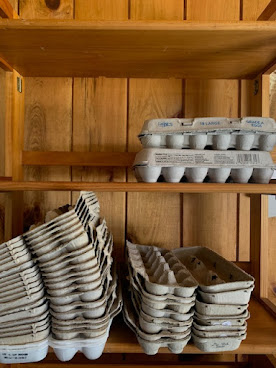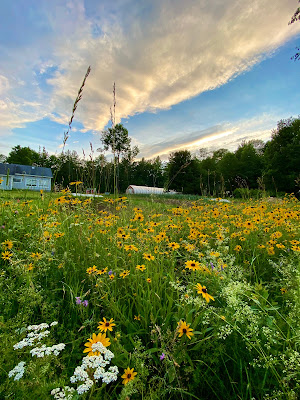How to be more Plant-based? Why to go Vegan?
People have different reactions when it comes to the Vegan diet. People tend to think it's impossible or limiting. And for some it is, which is truly okay. Overall, it's important to understand that you don’t need to go fully vegan in order to witness the benefits to yourself and to the rest of the world.
First off, the Vegan diet forces you to avoid eating any animal product, including all dairy, meat, fish and other chemicals that are extracted from animals and or animal products. This diet focuses on eating whole foods along with fats and plant protein. As of recently, vegan restaurants that serve vegan options on their menus have been popping up all around the country.
So Why?
Veganism is better for the environment as it helps to reduce the impacts of raising meat such as beef. Raising cattle requires tons of land and also contributes to increased global methane levels thus exacerbating climate change. For your personal health, a vegan diet can lower blood pressure and cholesterol. Veganism also strengthens the immune system and can limit amount of artificial hormones in the body. Additionally, veganism combats global food insecurity, while also protesting factory farming. In this way, vegans are able to source their food better to ensure its purity and cleanliness.
Believe it or not, veganism can be cheaper than eating dairy and meat. Veganism improves digestion and builds lean muscle mass over time as well.
Some common myths include things like:
-“You can’t get enough food"
-“You won’t take in enough protein"
-“Its too expensive"
-“You have to eat the same things day in and day out"
-“You can’t be strong if you’re vegan"
-“Going vegan is too hard"
-“Vegan food prep takes a lot of time”
All of these things are usually huge concerns when someone is considering going vegan. However, with time, experience and patience you’ll be able to bust all of these myths.
How can you ensure that you’re doing the vegan diet correctly?
-Do lots of research by watching documentaries, researching recipes and reading books.
-Ease into the diet. You can’t expect yourself to speed into this.
-Go grocery shopping and look at all of the different food options.
-Join a vegan forum or talk to others who are vegan about their experiences.
-Eat a lot and/or very often so that you maintain your energy levels throughout the day and night.
-Plan balanced meals (protein, fat and lots of carbs).
-Prep your friends and family about it. Plan your meals and decide where you can go out to dinner.
-Get excited because you’re about to make a difference in the world and in your personal health!
Common mistakes include things like:
-not eating enough food
-not eating enough healthy FAT
-eating only Vegan junk food
-quitting too soon
-feeling badly when you “cheat”
Again, all of these things take time to perfect so allow yourself the space and time to understand and learn from any mistakes and/or mishaps you have along the way.
Differences between going fully vegan vs. following a plant-based diet?
Plant-based is the best way to ease into going fully vegan. Plant-based means that you can still eat meat, dairy and fish, but in smaller doses. This means that most of your meals contain plants, similar to that of the vegan diet.
Vegans do not eat any animal products, including meat, dairy, fish, eggs, other chemicals or additives that contain animal products.
Conclusion
We are not saying that you need to go fully vegan. We are saying that being more plant-based is totally doable and even fun! This post is meant to remind you that you can make a global difference with the foods that you put into your body on a daily basis.
Thanks for reading! - CCF
First off, the Vegan diet forces you to avoid eating any animal product, including all dairy, meat, fish and other chemicals that are extracted from animals and or animal products. This diet focuses on eating whole foods along with fats and plant protein. As of recently, vegan restaurants that serve vegan options on their menus have been popping up all around the country.
So Why?
Veganism is better for the environment as it helps to reduce the impacts of raising meat such as beef. Raising cattle requires tons of land and also contributes to increased global methane levels thus exacerbating climate change. For your personal health, a vegan diet can lower blood pressure and cholesterol. Veganism also strengthens the immune system and can limit amount of artificial hormones in the body. Additionally, veganism combats global food insecurity, while also protesting factory farming. In this way, vegans are able to source their food better to ensure its purity and cleanliness.
Believe it or not, veganism can be cheaper than eating dairy and meat. Veganism improves digestion and builds lean muscle mass over time as well.
Some common myths include things like:
-“You can’t get enough food"
-“You won’t take in enough protein"
-“Its too expensive"
-“You have to eat the same things day in and day out"
-“You can’t be strong if you’re vegan"
-“Going vegan is too hard"
-“Vegan food prep takes a lot of time”
All of these things are usually huge concerns when someone is considering going vegan. However, with time, experience and patience you’ll be able to bust all of these myths.
How can you ensure that you’re doing the vegan diet correctly?
-Do lots of research by watching documentaries, researching recipes and reading books.
-Ease into the diet. You can’t expect yourself to speed into this.
-Go grocery shopping and look at all of the different food options.
-Join a vegan forum or talk to others who are vegan about their experiences.
-Eat a lot and/or very often so that you maintain your energy levels throughout the day and night.
-Plan balanced meals (protein, fat and lots of carbs).
-Prep your friends and family about it. Plan your meals and decide where you can go out to dinner.
-Get excited because you’re about to make a difference in the world and in your personal health!
Common mistakes include things like:
-not eating enough food
-not eating enough healthy FAT
-eating only Vegan junk food
-quitting too soon
-feeling badly when you “cheat”
Again, all of these things take time to perfect so allow yourself the space and time to understand and learn from any mistakes and/or mishaps you have along the way.
Differences between going fully vegan vs. following a plant-based diet?
Plant-based is the best way to ease into going fully vegan. Plant-based means that you can still eat meat, dairy and fish, but in smaller doses. This means that most of your meals contain plants, similar to that of the vegan diet.
Vegans do not eat any animal products, including meat, dairy, fish, eggs, other chemicals or additives that contain animal products.
Conclusion
We are not saying that you need to go fully vegan. We are saying that being more plant-based is totally doable and even fun! This post is meant to remind you that you can make a global difference with the foods that you put into your body on a daily basis.
Thanks for reading! - CCF









Comments
Post a Comment